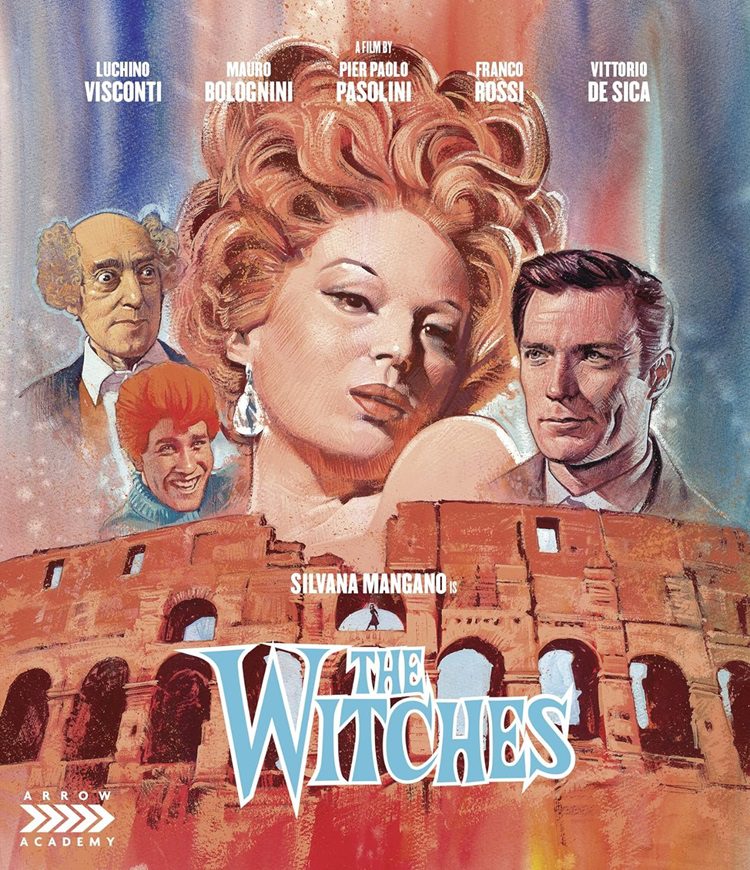
The concept of an anthology film in which you make one long movie consisting of several short films seems like a good one. Presumably, it is easier to wrangle big name directors and stars as the time commitment will be shorter than a full-length feature. You can have a variety of different genres and styles and if one film is a dud, then you’ve got several others that can compensate. And yet it is rare thing in which I’ve ever enjoyed an anthology film. It’s a bit like short-story collections to me. It’s difficult to tell an engaging story in a short period. The bad ones taint the good ones and the good ones are always over too soon.
In the mid-’60s, Dino De Laurentis (famed producer of such films as La Strada, Bitter Rice and Europe ’51) decided to make an anthology film consisting of five shorts directed by five great Italians (Luchino Visconti, Mauro Bolognini, Pier Paolo Pasolini, Franco Rosso, and Vittorio De Sica), all of which would star Silvana Mangano as a witch. That last part of the memo must have got smudged over because even though the animated intro to the film stars a witch of the black-hat-wearing, broom-flying variety, there is not anything resembling witchcraft in any of the shorts. Maybe “witch” means something else in Italian or maybe it’s all metaphorical or something but I was sorely disappointed not to see the slightest hint of a spell or a boiling cauldron.
In The Witch Burned Alive, Mangano plays a famous actress who arrives at an Austrian chalet to spend an evening with friends. As the night wears on and the alcohol disappears, so does the kinder shades of civility. When the actress passes out, her friends tear her apart, removing most of her clothes, her false eyelashes, makeup and more, mocking her false beauty.
Civic Sense finds Mangano playing busy woman getting stuck in traffic behind an accident. She declares that she will help the injured man and rush him to the hospital but quickly we (and the poor sod with the banged-up head) find that she’s only saying this to get herself out of the traffic and she soon zips rapidly through the streets of the city, finally making her destination and discarding the man on the side of the road.
In The Earth as Seen From the Moon, a father and son mourn the death of their wife/mother and then wander about seeking another woman to fill her place. It is a comic adventure showing them having zero luck for over a year before stumbling upon a blind and deaf beauty. She agrees to marry the old man and quickly turns their shoddy hovel into a lovely home. But, as the onscreen words tell us, man is never satisfied with what he’s got and soon they have hatched a plan to make some dishonest money and find a better place. The woman agrees and it ends on a bittersweet and possibly supernatural (the only short to have any sort of possible magic in it) note.
In The Sicilian Belle, Mangano plays a Sicillian woman who tells her father a man made a pass at her. He quickly kills the man only to then be killed by his victim’s relative and blood is shed all over town as vengeance is reaped like bloody dominoes until we find the woman wailing operatically wondering how this could have happened.
An Evening Like The Others stars Clint Eastwood as a boring American married to Mangano who is deeply unsatisfied in her marriage. She fantasizes a more glamorous life in which Eastwood’s character is more charming and exciting.
Civic Sense and The Sicilian Belle are both amusing and mercifully short which puts them ahead of the rest. The Earth As Seen From the Moon is the quirkiest and thus the most interesting, but even it drags a bit. The other two were a chore to watch. It’s an interesting idea, but for the most part each part falls pretty flat.
Arrow Academy presents the film with a brand new 2K master and it looks good. I had never seen the film but online reports note that it has been significantly cleaned up from all previous available releases. It comes with with Italian and English-language versions (if you watch it in English, you do actually get to hear Clint Eastwood’s natural voice versus having the oddity of watching a voice that is obviously not his, and Italian come out of his mouth). Tim Lucas provides a very informative audio commentary and there is Arrow’s usual full color booklet with two informative essays in it.
The Witches is an odd little film that only really works in its super short segments, but is worth seeing if you have interest in any of the directors taking part.